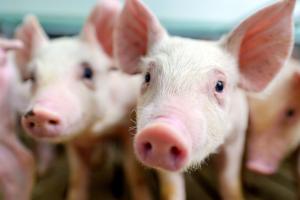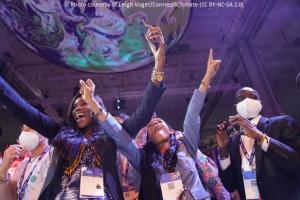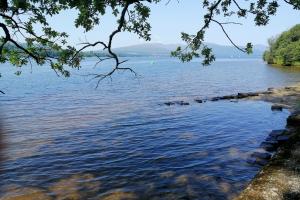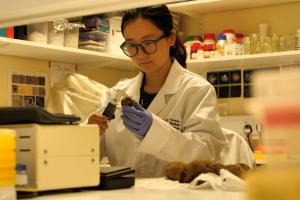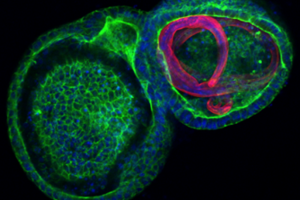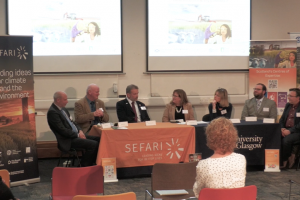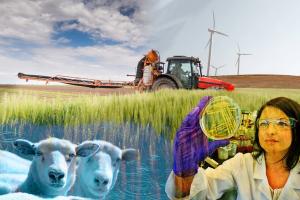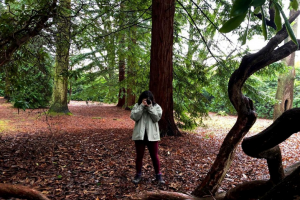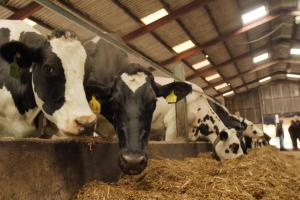The interconnection between people, animals, and their shared environment has been recognized for over a century and recently, the term ’One Health’ has come to describe this connection.
Here at SEFARI we work on a number of areas relevant to One Health, including our mental wellbeing and livestock wellbeing. Therefore, in this blog, I will explore how we can help our own mental wellbeing before focusing on livestock mental wellbeing, and more specifically on SEFARI research on pig welfare.
The climate crisis is a problem of global significance and not everyone has the privilege of accessing resources, or having their voices heard. This includes those for whom climate change will impact the greatest – future generations, as often the views of experts and policy makers seem to be given preference over those of the youth.
Water is a vital and essential part of our lives, but the impact of climate change is leading to there being too much water in some places and too little in others. This presents challenges that will require sustainable solutions, tailored to not only the issue but also the locality. Consequently, it is important we understand the many and varied benefits of water as a resource, and how we can tackle the issues we face now, and in the future.
In 2019, a Scottish Health Survey report, commissioned by the Scottish Government, highlighted that two in three adults are classified as overweight or obese (with a body mass index, BMI >25), the highest prevalence since 2003. This is a real concern because obesity, is linked to a range of serious health conditions including diabetes, cardiovascular disease (CVD), hypertension and certain cancers.
Here at SEFARI, we take pride in our partner institutes and their outstanding achievements in research and informing policy. We firmly believe that inequality in the sustainability sector must be addressed and are committed to using our platforms to showcase and commend remarkable women at all stages of their careers. Read on to celebrate the accomplishments of some of the outstanding SEFARI women.
The Moredun Research Institute (one of SEFARI’s members) alongside the Universities of Dundee, Edinburgh and Glasgow are forming a new and exciting network, called Scottish Parasitology Partnership in Research, Innovation, and Training (SPPIRIT), to support Scotland’s eminent parasitology research.
The climate emergency affects every part of our lives and collaboration within and across sectors is therefore key to addressing this crisis. With collaboration at their core, Scotland’s five Centres of Expertise (CoE) work together to connect research with, and respond to, policy needs across issues which affect the climate, water, animal and plant health, land and communities.
Even though COP26 is now over, there is still a strong focus on initiatives being taken by countries to address climate change. Scotland is committed to reaching net zero by 2045 and to delivering leadership and collaboration within the global response to tackling climate change.
In this blog, Lorna highlights her work in the creation of new resources which outline what is going on across the Centres of Expertise (CoE) to inform and support policy for climate action. Collation of this material from across the Centres was funded by SEFARI Gateway.
As the recent COP26 Gender Day in Glasgow has highlighted, there is much work to be done in increasing diversity and inclusion in the climate sector. Diverse voices are incredibly important in tackling all aspects of a changing climate, and these voices must be heard and valued. With this and a commitment to achieving a Just Transition to Net Zero in mind, SEFARI have asked me to share my experiences in this blog.
COP26, the United Nations Climate Change conference held in Glasgow, ended on Saturday the 13th of November. Since then, there has been a lot of stock taking as to what was achieved under the Glasgow Climate Pact. Several gains emerged in the first week of the conference, with the announcement of collective action on deforestation, coal, finance and methane.
